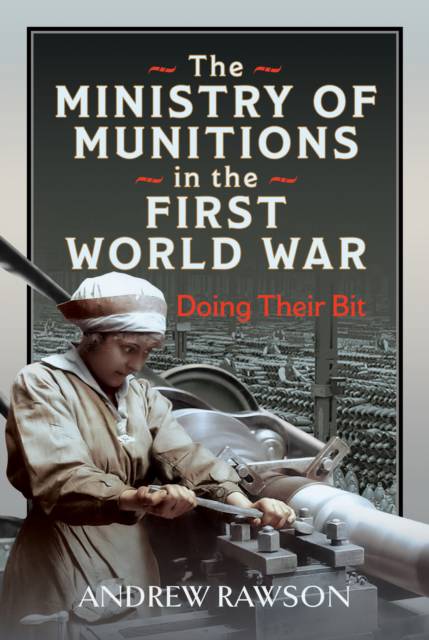
- Retrait gratuit dans votre magasin Club
- 7.000.000 titres dans notre catalogue
- Payer en toute sécurité
- Toujours un magasin près de chez vous
- Retrait gratuit dans votre magasin Club
- 7.000.0000 titres dans notre catalogue
- Payer en toute sécurité
- Toujours un magasin près de chez vous
The Ministry of Munitions in the First World War
Doing Their Bit
Andrew Rawson
Livre relié | Anglais
34,95 €
+ 69 points
Description
This is the history of Britain's munitions industry in the First World War. It begins with the shortages caused by an expanding army required to fight in trenches, then shows how the country was organised, with the expansion of private companies and the introduction of state owned factories. It also explains how new laws regulated industry.
The narrative describes how production was initially estimated, until experience illustrated how the armed services' demands could be met. It also looks at the problems caused by unchecked enlistment, which took no account of men's skills, and the attempts to recall key workers from the armed services.
The story continues with the raw materials, such as coal, which was dug by one million miners, and the huge amounts of iron ore imported from Spain. Learn how Britain's steel industry struggled to make enough forgings for shells, while many more were imported from North America. See how manufacturing issues were resolved, while battlefield experience led to modifications being made. Also see how the nation's chemical industry expanded to produce enough explosives before working out how to make large amounts of lethal gases.
Learn how the war required the relations between the government, the employers, the unions, and the workforce to change; in some cases, forever. See how diluting production allowed the workforce to increase and how tens of thousands of women entered the factories. Also hear how various issues caused widespread industrial unrest at times, as the cost of living rose and the rules became stricter. On a positive note, a desire to improve production increased awareness of health and safety, as well as the benefits of positive welfare.
The story ends with a nation being pushed to its limits suddenly demobilising, leaving everyone wondering what the future would hold for them.
The narrative describes how production was initially estimated, until experience illustrated how the armed services' demands could be met. It also looks at the problems caused by unchecked enlistment, which took no account of men's skills, and the attempts to recall key workers from the armed services.
The story continues with the raw materials, such as coal, which was dug by one million miners, and the huge amounts of iron ore imported from Spain. Learn how Britain's steel industry struggled to make enough forgings for shells, while many more were imported from North America. See how manufacturing issues were resolved, while battlefield experience led to modifications being made. Also see how the nation's chemical industry expanded to produce enough explosives before working out how to make large amounts of lethal gases.
Learn how the war required the relations between the government, the employers, the unions, and the workforce to change; in some cases, forever. See how diluting production allowed the workforce to increase and how tens of thousands of women entered the factories. Also hear how various issues caused widespread industrial unrest at times, as the cost of living rose and the rules became stricter. On a positive note, a desire to improve production increased awareness of health and safety, as well as the benefits of positive welfare.
The story ends with a nation being pushed to its limits suddenly demobilising, leaving everyone wondering what the future would hold for them.
Spécifications
Parties prenantes
- Auteur(s) :
- Editeur:
Contenu
- Nombre de pages :
- 280
- Langue:
- Anglais
Caractéristiques
- EAN:
- 9781036115388
- Date de parution :
- 18-09-25
- Format:
- Livre relié
- Format numérique:
- Genaaid
- Dimensions :
- 159 mm x 235 mm
- Poids :
- 520 g

Les avis
Nous publions uniquement les avis qui respectent les conditions requises. Consultez nos conditions pour les avis.






